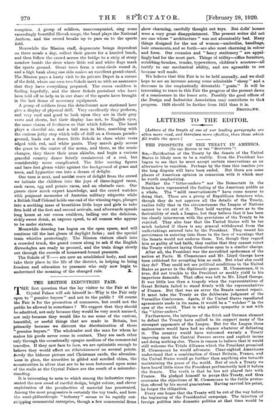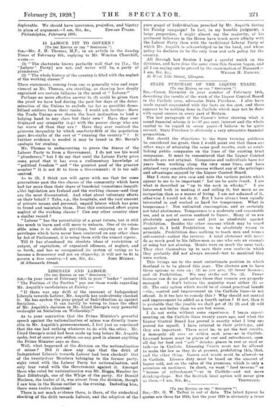LETTERS TO THE EDITOR.
[Letters of the length of one of our leading paragraphs are often more read, and therefore more effective, than those which fill treble the space.]
THE PROSPECTS OF THE TREATY IN AMERICA. (To THE EDITOR OF THE " 8PEOFATOR."1
Sia,—Ratification of the Treaty by the Senate of the United States is likely soon to be a reality. Even the President has begun to see that he must accept certain reservations as an alternative to rejection. Perhaps by the time this reaches you the long dispute will have been ended. But there are some phases of American opinion in connexion with it which may be worth emphasizing.
Neither the " bitter-enders " nor the Democrats in the Senate have represented the feeling of the American public as a whole. The " mild reservationists " have come nearer to doing that. These are a group of Republican Senators who, though they do not approve all the details of the Treaty, realize fully that in the circumstances the League of Nations cannot be cut out of it. They hold varying views as to the desirability of such a League, but they believe that it has been too closely interwoven with the provisions of the Treaty to be rejected. They also fear that the United States will be too much isolated if there is any general withdrawal from the undertakings entered into by the President. They resent his persistence in entering into them in the face of warnings that the Senate would not endorse them. Yet, though they regard him as guilty of bad faith, they realize that they cannot reject the Treaty without laying themselves open to a similar charge.
After all, the President was the accredited spokesman of the nation at Paris. M. Clemenceau and Mr. Lloyd George have been criticized for accepting him as such. But what else could they do? They could not use political conditions in the United States as pawns in the diplomatic game. M. Clemenceau, it is true, did not truckle to the President or meekly yield to his imperious demands. That office was left to Mr. Lloyd George. It was little less than a tragedy when the representatives of Great Britain failed to stand firmly with the representatives of France. But that was an error the Senate cannot repair. It must take the Treaty as the deliberate judgment of the Versailles Conference. Again, if the United States repudiated agreements made in its name, it would be a " welsher " in the eyes of the world. That is why public sympathy is not with the "bitter-enders."
Furthermore, the intrigues of the Irish and German element to defeat the Treaty have rallied to its support many of the strongest opponents of the League. But for the League these malcontents would have had no chance whatever of defeating it. The country would have welcomed warmly a Treaty imposing upon the Central Powers severe and explicit terms and doing nothing else. There is reason to believe that it would still welcome the Triple Alliance which the President promised
M. Clemenceau he would advocate. Clear-sighted Americans understand that a combination of Great Britain, France, and the United States would go further than anything else towards maintaining the peace of the world. But of such a Treaty we have heard little since the President perfunctorily laid it before the Senate. The truth is that he has not played fair with France. He pledged himself to purge this Treaty, and thus overcame the objections of M. Clemenceau to the futile protec- tion offered by his moral guarantees. Having carried his point, he forgot the obligation.
Every one hopes that the Treaty will be out of the way before the beginning of the Presidential campaign. The injection of foreign politics into domestic politics at that time would be deplorable. We should have ignorance, prejudice, and bigotry



































 Previous page
Previous page